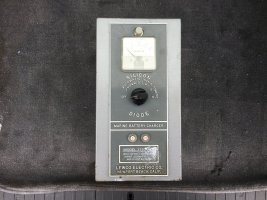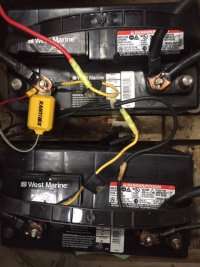You are using an out of date browser. It may not display this or other websites correctly.
You should upgrade or use an alternative browser.
You should upgrade or use an alternative browser.
Battery Charger Not Charging
- Thread starter Filkee
- Start date
Sailingfun
Member III
Please. DO NOT sink on the marina, dispose properlyIf this original equipment remains on board, upgrade immediately, or at least before buying new batteries.
View attachment 35210
If this original equipment remains on board, upgrade immediately......
I wonder if the knob on the front is what activated the wind-up spring to make the unit operate.......
On CruiserForum recently there was a discussion about failure of a ProMariner charger that caused a fire. The brief story is that the charger cables provide a path to ground if the transformer or some other internal parts develop a short. The charger cable wire diameters are only enough to carry the intended 15 to 20 amp load, so putting hundreds of amps of direct short-circuit in output from a battery onto the charger wires led to this:

To burn off the insulation from the charger cable to the battery, and along the ground cable of the charger meant that they turned red hot. This can ignite fuel fumes, cloth or other flammables. It also cause the loss of any other wires in the bundle to simultaneously disable whatever circuits existed for the motor, instruments, radio, chart plotter, lights, solar, etc.
The fix is cheap, quick, and easy. Simply install a fuse between the charger cable and where it attaches to the battery (or circuit). The fuse ought to be 10-20 amps heavier than the charger is set to deliver, such as a 25-30A fuse for a 15A charger. The charger is not essential so the fuse can be a cheap automotive one or a good one from BlueSeas like this:
 www.bluesea.com
www.bluesea.com

To burn off the insulation from the charger cable to the battery, and along the ground cable of the charger meant that they turned red hot. This can ignite fuel fumes, cloth or other flammables. It also cause the loss of any other wires in the bundle to simultaneously disable whatever circuits existed for the motor, instruments, radio, chart plotter, lights, solar, etc.
The fix is cheap, quick, and easy. Simply install a fuse between the charger cable and where it attaches to the battery (or circuit). The fuse ought to be 10-20 amps heavier than the charger is set to deliver, such as a 25-30A fuse for a 15A charger. The charger is not essential so the fuse can be a cheap automotive one or a good one from BlueSeas like this:
MRBF Terminal Fuse - 30A - Blue Sea Systems
Space-saving ignition protected fuse for 30 to 300 Amp loads. Must use with Terminal Fuse Block.
Last edited:
If that 40A charger is really a 40A charger to a battery, then yes, a 50A fuse should work fine. Depending on the AWG of the charger cable you probably could go slightly heavier, but the point is to prevent a direct battery short going through that cable to ground through the charger.
I wrote IF that charger. . . .
Because a 40A charger to two batteries may only be able to deliver 20A to each and the cables may be accordingly smaller. Check the charger owners manual to know. If so each would go back to needing a smaller fuse to match.
I wrote IF that charger. . . .
Because a 40A charger to two batteries may only be able to deliver 20A to each and the cables may be accordingly smaller. Check the charger owners manual to know. If so each would go back to needing a smaller fuse to match.
1911tex
Sustaining Member
If that 40A charger is really a 40A charger to a battery, then yes, a 50A fuse should work fine. Depending on the AWG of the charger cable you probably could go slightly heavier, but the point is to prevent a direct battery short going through that cable to ground through the charger.
"I wrote IF that charger. . . .
Because a 40A charger to two batteries may only be able to deliver 20A to each and the cables may be accordingly smaller. Check the charger owners manual to know. If so each would go back to needing a smaller fuse to match."
Bob: Here is a pic of my house batts. The left terminal cables are red positive (Out of picture). I don't like to assume; however, per your suggestion...20 amp fuse to each positive red wire terminal for my new 40amp charger (to be installed this weekend)? The small black accessory fuses present are 25amp for the current 20amp charger. I am replacing the old 20amp charger with a new 40amp charger. The batteries are 80 amp. each. I have no clue what the upper battery yellow Xantrex fuse protects..?
Attachments
Last edited:
Your charger cables are fused within 7" of each battery terminal, which is what you want. The charger can develop a dead short and you'll just blow a fuse with no risk to you or the boat. [thumbs up]
What is the make and model of the new charger? Take a look at the owners manual and somewhere it will tell the max output per battery. That's what you need to find.
While saying it will put out 40A is good marketing (bigger numbers are always better) it would be pretty uncommon to hit a 12V battery with 40A so my guess is that it'll top at 20 per battery. IF IF IF that's indeed the case, the existing fuses ought to work (maybe nuisance trip though) till you swap each for a 30A.
In doing so, you should get rid of the existing yellow fuse holders because the wires are too thin for 30A. It looks like the red charger cables are 10 AWG and the yellow fuse holder wires are maybe 12 or 14 AWG, so only rated for 25A and 20A respectively.
You could splice in similar fuse holders made with 10AWG wire or simply put in a couple of <$6 terminal fuses like these and eliminate two splices which could corrode over time:
(btw - Annapolis-based PKYS is just a couple of guys who always have great prices and have become my go-to for this kind of stuff. Michael always answers the phone.)
The yellow Xantrex dongle looks like another fuse holder of the type used for little AC inverters. Re-arrange the attachments to that post so the heavy copper lug currently on top is on the bottom. Check the red 14-ish AWG wire at the left edge of the photo to make sure it is fused.
Then get some red rubber caps for each of the + battery terminals before you drop a wrench in there. Like I'd do. I'm going to assume you have the battery hold-down straps removed for maintenance or the photo.

What is the make and model of the new charger? Take a look at the owners manual and somewhere it will tell the max output per battery. That's what you need to find.
While saying it will put out 40A is good marketing (bigger numbers are always better) it would be pretty uncommon to hit a 12V battery with 40A so my guess is that it'll top at 20 per battery. IF IF IF that's indeed the case, the existing fuses ought to work (maybe nuisance trip though) till you swap each for a 30A.
In doing so, you should get rid of the existing yellow fuse holders because the wires are too thin for 30A. It looks like the red charger cables are 10 AWG and the yellow fuse holder wires are maybe 12 or 14 AWG, so only rated for 25A and 20A respectively.
You could splice in similar fuse holders made with 10AWG wire or simply put in a couple of <$6 terminal fuses like these and eliminate two splices which could corrode over time:
Blue Sea Systems 5250 Fuse MIDI 30A
shop.pkys.com
The yellow Xantrex dongle looks like another fuse holder of the type used for little AC inverters. Re-arrange the attachments to that post so the heavy copper lug currently on top is on the bottom. Check the red 14-ish AWG wire at the left edge of the photo to make sure it is fused.
Then get some red rubber caps for each of the + battery terminals before you drop a wrench in there. Like I'd do. I'm going to assume you have the battery hold-down straps removed for maintenance or the photo.
1911tex
Sustaining Member
Thanks for the quick reply Bob! Here is the new charger:
Per your recommendation, I will contact Michael and give your reference...I appreciate it! Yes, Blue Sea Systems! I will follow your advice above as well..sure helps for folks like you instilling the correct methods for folks like me who seem to be lost on occasion!
ProNautic 1240P
Industry recognized with the 2010 IBEX Innovation Award, ProNauticP employs our Generation 3 ProMar Digital Performance Charging Platform which combines all digital control and softwarebased power conversion technology with global energy management features. ProNauticP addresses the trend of...
www.promariner.com
Copied below from pg 11 of the owners manual you will want a 50A fuse for each battery, not the 30A that I guessed at. A 50A short thru 10AWG wire will not raise the wire temp to the rated 105C so this works.
2. Fuse Selection - As illustrated in the diagram, each positive conductor from the charger to the battery/battery bank must be fused. Choose a fuse that is 10 amps higher than the charger output (e.g. 60 amps, choose a fuse of 70 amps). These fuses come in a variety of sizes and types. When choosing the proper fuse consider the connection to the DC cable (inline types for smaller amperages, stud and nut connections for larger amperages) as well as the availability of replacements. Fuses and holders are available through ProMariner or your local marine supply store.
2. Fuse Selection - As illustrated in the diagram, each positive conductor from the charger to the battery/battery bank must be fused. Choose a fuse that is 10 amps higher than the charger output (e.g. 60 amps, choose a fuse of 70 amps). These fuses come in a variety of sizes and types. When choosing the proper fuse consider the connection to the DC cable (inline types for smaller amperages, stud and nut connections for larger amperages) as well as the availability of replacements. Fuses and holders are available through ProMariner or your local marine supply store.
1911tex
Sustaining Member
Thank you again Bob...and thank you for taking the time to read the manual!!! My next project..READ THE MANUAL! I will order 50 amp fuses/holders for each battery for my new 40 amp charger, from Michael at Blue Sea Systems tomorrow.....with your reference.
 www.bluesea.com
www.bluesea.com
Blue Sea Systems - Innovative Electrical Systems — Built to last
Engineering high quality marine electrical components for safety, reliability and performance
Last edited:


